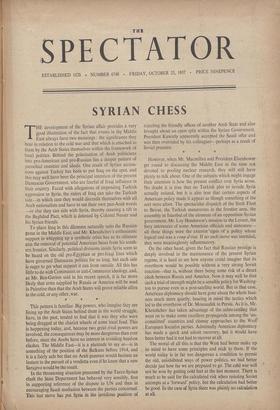SYRIAN CHESS
THE development of the Syrian affair provides a very good illustration of the fact that events in the Middle East always have two meanings : the significance they bear in relation to the cold war and that which is attached to them by the Arab States themselves within the framework of local politics. Behind the polarisation of Arab politicians into pro-American and pro-Russian lies a deeper pattern of parochial enmities and ideals. One result of Syrian accusa- tions against Turkey has been to put Iraq on the spot, and this may well have been the principal intention of the present Damascus Government, who are fearful of Iraqi influence in their country. Faced with allegations of impending Turkish aggression in Syria, the rulers of Iraq can take the Turkish side—in which case they would discredit themselves with all Arab nationalists and have to eat their own pan-Arab words —or else they can side with Syria, thereby creating a rift in the Baghdad Pact, which is detested by Colonel Nasser and his Syrian friends.
To place Iraq in this dilemma naturally suits the Russian game in the Middle East, and Mr. Khrushchev's enthusiastic support in whipping up a synthetic crisis has as its ultimate aim the removal of potential American bases from his south- ern frontier. Similarly, political divisions inside Syria seem to be based on the old pro-Egyptian or pro-Iraqi lines which have governed Damascus politics for so long, but each side is eager to get what support it can from outside. All this has little to do with Communist or anti-Communist ideology, arid, as Mr. Ben-Gurion said in his recent speech, it is far more likely that arms supplied by Russia or America will be used in Palestine than that the Arab States will prove reliable allies in the cold, or any other, war.
* * * This pattern is familiar. Big powers, who imagine they are lining up the Arab States behind them in the world struggle, have, in the past, tended to find that it was they who were being dragged at the chariot wheels of some local feud. This is happening today, and, because two great rival powers are involved, the consequences may be more dangerous than ever before, since the Arabs have no interest in avoiding head-on clashes. The Middle East—it is a platitude to say so—is in something of the position of the Balkans before 1914, and it is a fairly safe bet that no Arab gunman would hesitate an instant in the pursuit of a vendetta even if he knew that a new Sarajevo would be the result.
In the threatening situation presented by the Turco-Syrian clash the State Department has behaved very sensibly, first in supporting reference of the dispute to UN and then in encouraging Saudi mediation between the parties concerned. This last move has put Syria in the invidious position of rejecting the friendly offices of another Arab State and also brought about an open split within the Syrian Government. President Kuwatly apparently accepted the Saudi offer and was then overruled by his colleagues—perhaps as a result of Soviet pressure. * * However, when Mr. Macmillan and President.Eisenhower• get round to discussing the Middle East in the time not devoted to pooling nuclear research, they will still have plenty to talk about. One of the subjects which might engage their attention is how the present conflict over Syria arose. No doubt it is true that no Turkish plot to invade. Syria actually existed, but it is also true that certain aspects of American policy made it appear as though something of the sort were afoot. The spectaCular dispatch of the Sixth Fleet to Beirut, the Turkish manoeuvres in the frontier area, the assembly in Istanbul of the elements of an opposition Syrian government, Mr. Loy Henderson's mission to the Levant, the fiery utterances of some American officials and statesmen— all these things were the exterior of a policy whose logical end was a coup d'etat. If no such move was intended, they were meaninglessly inflammatory.
On the other hand, given the fact that Russian prestige is deeply involved in the maintenance of the present Syrian regime, it is hard to see how anyone could imagine that its overthrow would be possible without a very strong Soviet reaction—that is, without there being some risk of a direct clash between Russia and America. Now it may well be that such a trial of strength might be a sensible policy for Washing- ton to pursue even in a post-satellite world. But in that case, American diplomacy should have gone about the whole busi- ness much more quietly, bearing in mind the tactics which led to the overthrow of Dr. Moussadek in Persia. As it is, Mr. Khrushchev has taken advantage of the sabre-rattling that went on to make some excellent propaganda among the 'un- committed' countries and clumsy approaches to' the West- European Socialist parties. Admittedly American diplomacy has made a quick and adroit recovery, but it would have been better had it not had to recover at all.
The moral of all this is that the West had better make up its mind to have some principles and stick to them. If the World today is in far too dangerous a condition to permit the old, uninhibited ways of power politics, we had better decide just how far we are pre,pared to go. The cold war will not be won by getting cold feet at the last moment. There is much to be said for the calculated risk when resisting Soviet attempts at a 'forward' policy, but the calculation had better be good. in the case of Syria there was plainly no calculation at all.


































 Previous page
Previous page